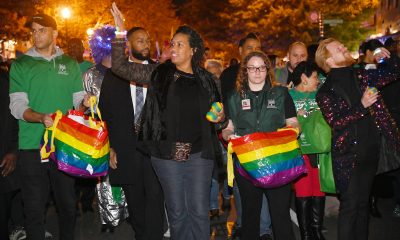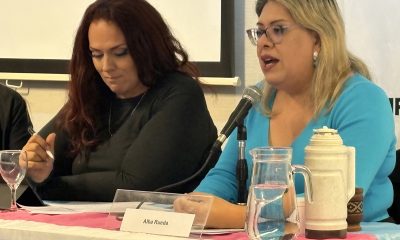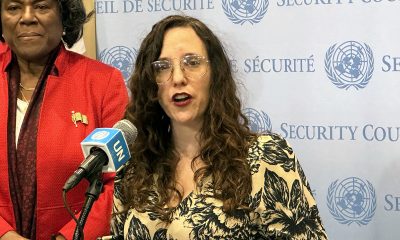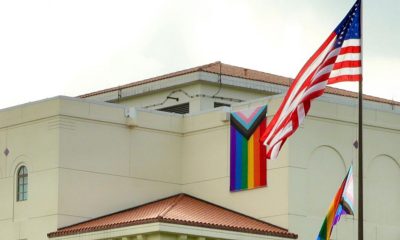Argentina
LGBTQ seniors in Argentina face uncertain future
President Javier Milei’s policies have disproportionately impacted retired pensioners

Editor’s note: International News Editor Michael K. Lavers will be on assignment in Argentina and Uruguay through April 12.
Argentina has undergone significant changes in its economic and social policies since President Javier Milei’s inauguration in December 2023. These changes have had a significant impact on various sectors of society, especially retirees and the LGBTQ community.
Mercedes Caracciolo, a 79-year-old sociologist and lesbian activist, shared her experience with the Washington Blade on how the new measures have affected her quality of life.
“Since Milei’s arrival in government, which began with a brutal devaluation, I am more careful in my spending than I was before,” she said.
Although Caracciolo has additional income from rental properties, she recognizes the situation is much more critical for those who exclusively depend on a pension.
With more than 7 million people receiving pensions, many find themselves “scratching the poverty line” due to the loss of purchasing power. The libertarian government’s economic policies have drastically affected their welfare, leading to a wave of protests across the country.
The reduction of social programs and the lack of LGBTQ-specific public policies have deepened the difficulties that seniors already face. The loss of economic stability particularly affects those who have historically lived on the margins, with fewer job opportunities and limited access to a decent retirement. Many older LGBTQ people, who have spent their lives unable to form traditional families, now find themselves without a support network and with an increasingly less present State.
The advance of conservative discourses has also generated a climate of insecurity and fear.
“There is no more sense of security and stability in old age,” Graciela Balestra, a psychologist who is the president of Puerta Abierta a la Diversidad, the first home for LGBTQ seniors in Argentina, explained. “Many LGBTQ+ retirees fear that there are fewer and fewer rights. They see what is happening in Argentina and globally with the advance of the right wing, and they feel that what they worked so hard to achieve is in jeopardy.”
In addition to economic difficulties, the LGBTQ community has faced additional challenges.
Caracciolo noted many supportive spaces have had their government subsidies reduced or eliminated, weakening community networks essential to the well-being of LGBTQ seniors.
“Community networks are also weakened because many of them require state support for certain types of expenses,” she noted.
Balestra warned about the psychological impact.
“Obviously it impacted mental health. There is much more anxiety, there is fear. People who say ‘I’m afraid they’ll kill me’ or ‘I’m afraid to show myself,'” she said. “Before, they used to walk down the street holding hands with their partner, and now they don’t do it anymore. A lot of hopelessness.”
For Balestra, the concern goes beyond the LGBTQ community.
“The economic issue, the rights issue, the fear that something similar to the dictatorship will return. All of this is very scary. And besides, the hopelessness of believing that this is going to continue, that it is not going to change even in the next elections,” she said.
Civil society organizations have denounced an “adjustment” in policies related to gender and diversity that Milei’s government has undertaken. Pride marches in Argentina have become a stage for protests against the president’s policies, especially over his speeches that activists consider hateful towards the LGBTQ community.
Balestra stresses the fear is not only individual, but collective.
“Human rights no longer exist anywhere, women no longer have the place they used to have, they are once again objectified, machismo is on the rise again,” she said. “This brings a lot of despair to older people.”
Despite the climate of uncertainty, Balestra emphasizes resistence forces are still in force.
“We continue working, as always,” she said. “For 25 years at Puerta Abierta we have been doing reflection groups, cultural workshops, social meetings, all with respect to being able to make LGBT people aware of their rights. We never stop meeting, but lately we are talking more and more about these things that we had already left a little behind. The issue of coming out, fear, visibility. Now we have to talk about it again.”
Argentina
Argentina’s transgender community confronts ‘chaotic, desperate’ situation
President Javier Milei has implemented several anti-trans directives

Editor’s note: Washington Blade International News Editor Michael K. Lavers will be on assignment in Argentina through April 12.
BUENOS AIRES, Argentina — A group of Argentine transgender activists with whom the Blade spoke on April 4 said President Javier Milei’s policies have made their community even more vulnerable to violence, discrimination, and poverty.
“The situation is really chaotic, desperate,” said Florencia Guimares García, a travesti activist who is president of the House of Lohana and Diana Civil Association. “There is also a lot of fear among the trans and travestí community towards the government’s policies.”
Guimares’s group is named after Diana Sacayán, a prominent trans activist who was stabbed to death inside her Buenos Aires apartment in 2015, and Lohana Berkins, the founder of the Association for the Fight for Travesti and Transsexual Identity who died in 2016.
Guimares and three other trans activists — Julia Amore, Sasha Solano, and Daniela Ruíz — spoke with the Blade after they participated in a trans and travestí rights forum that took place at an LGBTQ cultural center in downtown Buenos Aires. Alba Rueda, the country’s former special envoy for LGBTQ rights, also took part.
“We are in a bad moment for the rights and quality of life of LGBTQ+ people,” Rueda told the Blade during a February 2024 interview.

Milei took office on Dec. 10, 2023, after he defeated then-Economy Minister Sergio Massa in the second round of that year’s Argentina’s presidential election. Rueda resigned before Milei assumed the presidency.
Milei, an economist and former congressman, shortly after he took office eliminated the country’s Women, Gender and Diversity Ministry.
Milei last year closed the National Institute Against Discrimination, Xenophobia and Racism, a government agency known by the acronym INADI that provided support and resources to people who suffered discrimination based on sexual orientation, gender identity, and other factors. Milei in 2024 also dismissed trans people who the government hired under the Trans Labor Quota Law, which set aside at least 1 percent of public sector jobs for trans people.
Argentina’s landmark Gender Identity Law that, among other things, allows trans and nonbinary people to legally change their gender without medical intervention, took effect in 2012 when Cristina Fernández de Kirchner was president. Milei on Feb. 5 issued a decree that restricts minors’ access to gender-affirming surgeries and hormone treatments.
Gay Congressman Esteban Paulón, a long-time LGBTQ activist, filed a criminal complaint against Milei after he linked the LGBTQ community to pedophilia and made other homophobic and transphobic comments during a Jan. 23 speech at the World Economic Forum in Davos, Switzerland. Millions of people in Buenos Aires and across Argentina participated in marches against Milei that took place less than two weeks later.

Milei is among the heads of state who attended President Donald Trump’s inauguration. Milei also spoke at this year’s Conservative Political Action Conference in National Harbor, Md.
“Violence is more explicit, more common,” Guimares told the Blade, noting police violence has become more common against sex workers who are trans or travestí since Milei took office. Guimares added this situation is worse outside of Buenos Aires.
“The situation is different, depending on the location, and even more so in other provinces,” she said. “Even living in the province of Buenos Aires isn’t the same as living in Salta, or in Jujuy, or in Corrientes, or in provinces where the population is more conservative, where the discourse from the churches is much stronger, where all of this has a much crueler impact.”
“Milei’s discourse has legitimatized all of this,” added Guimares.
Amore said Argentina before Milei “had been a beacon” for human rights around the world.
“We’ve been building these laws with a lot of struggle, a lot of effort, with allies, and it wasn’t enough because we didn’t reach our goal,” she said. “These are very young. Our democracy is very young; we have a 40-year-old democracy and we are talking about a Gender Identity Law that is 12-years-old.
Amore added Milei is trying to erase trans and travestí people. Ruiz, an activist and actress who founded Siete Colores Diversidad, agreed.
“It is a cultural battle for us,” Ruiz told the Blade, referring for the continued struggle for trans and travestí rights in Argentina.
“It marks a cultural paradigm shift that we were carrying out day after day, making ourselves visible,” she added. “We carried it out by making ourselves politically visible, by presenting our travestí and trans Latin American visibility as a beacon to the world.”
The activists spoke with the Blade less than three months after Trump took office.
The American president, like Milei, has targeted the trans community with executive orders and policy directives. These include banning the State Department from issuing passports with “X” gender markers and prohibiting trans adults and young people from sports teams that correspond with their gender identity.
Solana, a trans woman from Peru who advocates on behalf of migrants, noted one of the first executive orders that Trump signed directed the federal government to only recognize two genders: Male and female.
“Man and woman. Period,” she said.
Guimares added Milei’s anti-LGBTQ discourse isn’t even his “original speech, but rather a line drawn from the U.S. government of Donald Trump and its agenda, which he established from the beginning and which he campaigned on as well.”
“This also follows in line with parties like Vox in Spain and other European countries, where we see how in Hungary, where an LGBTI Pride march (in Budapest) is now banned, and in other countries around the world where the population is having a really hard time,” said Guimares. “So, it’s not something original from Milei, but rather he’s taking part in those political agendas to generate strategies and alliances to be able to access economic resources.”
Amore, for her part, urged her American counterparts to continue the fight.
“Don’t let down your guard,” said Amore. “Organize. Come together. Speak out. Become visible in community. Respect the diversity of voices and put your own voices first and make yourselves more visible.”
Argentina
Argentine president restricts transgender minors access to hormone treatments, surgeries
Advocacy groups say they could challenge Javier Milei’s decree in court

Argentine President Javier Milei on Feb. 5 issued a decree that restricts minors’ access to gender-affirming surgeries and hormone treatments.
Human rights organizations and LGBTQ groups have condemned the edict that modifies Argentina’s landmark Gender Identity Law.
The International Lesbian, Gay, Bisexual, Trans and Intersex Association for Latin America and the Caribbean (ILGALAC) and ILGA World have condemned the decree, noting it “imposes severe restrictions on the right to gender identity of trans and non-binary people, particularly young people.” They further state the restriction “ignores scientific evidence and the recommendations of international bodies, such as the World Health Organization (WHO) and the Inter-American Commission on Human Rights (IACHR).”
The Argentine Federation of Lesbians, Gays, Bisexuals and Trans (FALGBT), meanwhile, has announced it will go to court to stop the modification of the Gender Identity Law and, if necessary, will turn to international organizations. Legal experts have argued the decree is illegal and unconstitutional, and Argentina’s Supreme Court should intervene.
FALGBT President María Rachid, told the Washington Blade that “from the Argentine LGBT Federation we are filing a declaration of unconstitutionality for this DNU (the Spanish acronym for Necessary and Urgent Decree), because we consider that the president is begging for legislative powers that do not correspond to him. That law was approved by a wide majority in both chambers, where specialists of medicine, of law went to expose concrete research on these issues.”
“On the other hand, we are also going to file injunctions, both collective and individual, to defend the rights of trans children and adolescents, mainly,” said Rachid. “It is not true what he (Milei) says to justify this absolute intrusion to legislative powers, saying that 5-year-old children are mutilated. This is not true. Genital reassignment operations are performed after the age of 18, even by medical indication.”
This decree is in addition to other measures of Milei’s government that affect the LGBTQ community, such as the prohibition of gender-affirming treatments and surgeries for minors and limits on housing transgender women in female prisons.These actions have generated controversy and concern among human rights advocates and international organizations.
“President Javier Milei, since he took office, has been carrying out a series of measures that directly affect the vast majority of formal and informal workers in Argentina, and the LGBTIQNB population is no exception,” said Ornella Infante, a trans woman who is a national leader of the leftist Evita Movement. “In addition to the hate speeches that multiply violence; it is a class hatred to sectors with organizational and mobilization capacity such as women, unions, social movements, and sexual diversity.”
“It is exposed with the dismissals of LGBT people from national agencies, the definition of gender policies, the closure of INADI, a state agency that worked to eradicate discrimination in the country,” added Infante. “All of this directly affects vulnerable populations and painfully shows that it is part of their government’s ideals to end human rights policies.”
ILGA World has urged the international community, human rights organizations and democratic institutions to speak out against these measures and to demand the repeal of the decree, calling it “an abuse of executive power and a blow to democratic institutionality.”
Argentina
Millions march against Javier Milei in Argentina
Protests took place after president’s comments at World Economic Forum

Millions of people in Buenos Aires and across Argentina participated in marches against President Javier Milei in response to his controversial comments at the World Economic Forum in Davos, Switzerland.
The Buenos Aires march, led by LGBTQ, women’s and human rights organizations in Argentina, shaped up to be one of the largest demonstrations against Milei since he became president in December 2023. The mobilization is a direct response to Milei’s disparaging comments about feminism, LGBTQ rights, and other progressive movements.
Milei called “wokism” and “gender ideology” harmful during his Jan. 23 speech at the World Economic Forum, even comparing them to pedophilia. These statements sparked outrage across Argentina with protesters demanding the defense of human rights and equality.
María Rachid, president of the Argentine LGBT+ Federation, told the Washington Blade on Sunday “the march was massive, a strong message to President Milei putting a limit to hatred, discrimination and violence.”
“Argentine society built the values of respect for diversity, equality, and true freedom and yesterday it came out to defend them with massive demonstrations throughout the country and in many cities around the world,” said Rachid. “We are proud of what we were able to build because although they want to destroy it, it is already part of the heart of Argentine society.”
The Buenos Aires march began at the National Congress and ended at the Casa Rosada, the seat of the country’s presidency. Thousands of demonstrators, many with rainbow flags and banners that read “rights are not negotiable,” expressed their strong rejection of Milei’s policies.
Gay Congressman Esteban Paulón highlighted to the Blade “the call for the march was impressive.”
“I think it exceeded any forecast, not only because of the massiveness in the City of Buenos Aires, where it is estimated more than a million people, but also because of the massiveness in the 150 cities in which it was held throughout the country,” he said. “The truth is that it was a very, very big march in Rosario, in Córdoba, in Santa Fe, in Mar del Plata, in Bariloche, in the north, in Salta.”
“There was no expectation that it would be so, so massive, beyond the one in Buenos Aires, which had had an important call, an important visibility, which had added several actors,” added Paulón.

Sofía Díaz, a transgender woman who worked as a civil servant before Milei’s administration fired her, marched in Corrientes, a city in Chaco province.
“After President Milei’s speeches in Davos, the next day we started texting each other on WhatsApp,” she said, referring to public employees at the national level. “We were really afraid of what he had said.”
Activists around the world expressed solidarity with their Argentine counterparts.
Marches took place in cities around the world — including in Santiago, Chile; Montevideo, Uruguay; Rio de Janeiro; São Paulo; Mexico City; London; Madrid; Amsterdam; Berlin; Geneva; Paris; New York; Lisbon, Portugal; and the Spanish cities of Barcelona and Granada.
The Movement for Homosexual Integration and Liberation, a Chilean LGBTQ rights group, on Feb. 1 organized a march to the Argentine Embassy. Activists delivered a letter that expressed solidarity with the LGBTQ community and repudiated Milei’s policies against it.
-

 District of Columbia14 hours ago
District of Columbia14 hours agoWorldPride organizers may warn trans people from abroad not to attend event
-

 District of Columbia3 days ago
District of Columbia3 days agoLocal officials weighing impact of Trump’s D.C. executive order
-

 South Africa4 days ago
South Africa4 days agoUS-funded South African LGBTQ groups curtail operations
-

 Maryland2 days ago
Maryland2 days agoTrans Maryland founder: Trans people ‘are afraid’











